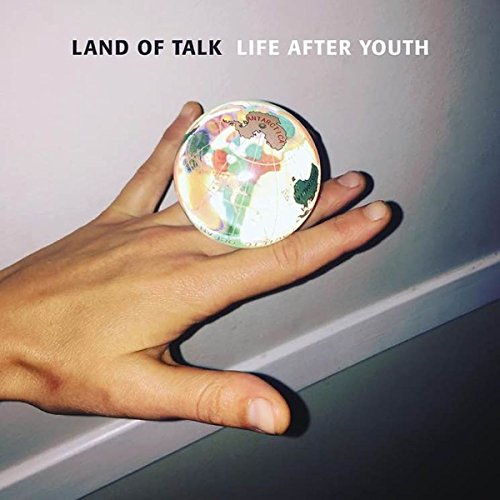
Land of Talk
Life After Youth
Release Date: May 19, 2017
Genre(s): Pop/Rock, Alternative/Indie Rock
Record label: Saddle Creek Records
Music Critic Score
How the Music Critic Score works
Buy Life After Youth from Amazon
Album Review: Life After Youth by Land of Talk
Great, Based on 10 Critics
Based on rating 8.6/10
In 2010, Elizabeth Powell's career was on fire. Her sophomore release under the moniker Land of Talk--which featured members of Arcade Fire and Stars no less--was garnering critical acclaim, eventually being longlisted for the 2011 Polaris Prize, Canada's album of the year award. The venues were getting bigger and bigger for the onetime Broken Social Scene member, riding the wave as indie rock was reaching peak popularity.
Based on rating 8/10
During the seven years between Cloak and Cipher and Life After Youth, Land of Talk's Elizabeth Powell went through a difficult stretch that made her consider giving up music. A 2011 laptop crash wiped out her demos, while caring for her father after his stroke in 2013 meant music was the farthest thing from her mind for several years. With some encouragement from her father, however, she began writing songs again, and Life After Youth's words and music are indelibly imprinted by her time away.
Based on rating 4/5
Seven years after previous LP ‘Clock and Cipher’ and Montreal’s Land of Talk waste no time in getting back to it. Opener ‘Yes You Were’ positively bursts out of the blocks, singer Elizabeth Powell pausing for nary a breath before delivering the kind of mellifluous, heart-busting vocal that first enticed Bon Iver to produce their superlative 2008 debut ‘Some Are Lakes’. From then, however, things take a turn for the introverted.
Based on rating 4/5
This seems to be the year many Can-indie faves are returning to the scene, including Land of Talk's Elizabeth Powell, back with new music after nearly seven years away. The time since 2010 album Cloak And Cipher was filled with hardship - Powell's father had a stroke, she lost the new music she'd been working on in a hard-drive crash - but Life After Youth finds her renewed rather than defeated or regretful. Reuniting with original drummer Bucky Wheaton, Land of Talk pick up where they left off, their guitar-focused indie rock updated with synths and subtle electro effects that add a fresh edge.
Based on rating 8/10
"Yes you were, you were on my mind!" These are the first words Land of Talk's Liz Powell shares with us after seven years of silence. It's hard to not hear them as a warm hug to listeners, saying, "Hello again, I didn't forget about you! I promise!" Powell has asserted that though it's a multipurpose sentiment, it was directed more at her old life and, specifically, her music; the message here, of both the song and her new record, Life After Youth, are as much for her as anyone. Powell wastes no time returning to form. Opener "Yes You Were" is a triumphant shot of jangly power pop that fires awake with a shock of guitar and vocals, picking right up where 2010's Cloak and Cipher left off.
Based on rating 7.5/10
After her father suffered a serious stroke however, a break became a necessity as she worked early hours and tended to him in his recovery each day. Somewhat poetically though, music therapy became a key part of his recovery, finding then its way back into her life; heeding her father's encouragement to embrace it fully again, Powell went off and wrote what would become the track "This Time". "I don't wanna waste it this time / And see fate as the end of me / I don't wanna waste it, my life / And know it was in front of me".
Based on rating 7/10
Getting older is a bust. As you age, expectations and responsibilities stare you down like a creaky old high school principal, except now you have to listen. More sinister and mysterious is the way of the flesh. Our body will eventually fail us, and there is nothing to stop it. This is not new ….
Based on rating 7/10
Land of Talk, the brainchild of Quebecois Elizabeth Powell, digs fresh and deep on the band's first album since 2010's Cloak and Cipher. We forgot how much Powell could rock in the minor key. Life After Youth cleaves drums with the magnets of synths, the collision like unearthed crop circles whizzing past our heads, ghostly and raw, Powell falling backwards through the sky playing with clashes and that soaring voice.
Based on rating 7.0/10
There was a moment shortly after Montreal's Land of Talk released their last album, 2010's Cloak and Cipher, when the band's longevity seemed quietly clear. As the Canadian indie pop boom hit its zenith and receded, something about Land of Talk sounded timeless. Never as bombastic as Arcade Fire or as saccharine as Stars, Land of Talk were more straightforward.
Based on rating 3/5
There's a certain kind of rock song that seems to envelop you in its own little bubble. For three minutes or so, everything outside slows to a crawl while goosebumps cover your arms and your heart swells like a trapped balloon. Life After Youth, the third album from Montreal's Land of Talk, features two such songs back-to-back. The first, This Time, begins abruptly with its not-so-secret weapon of a bassline already carving a mean strut while shoegazey guitars sigh hazy riffs in its wake.
'Life After Youth'
is available now

